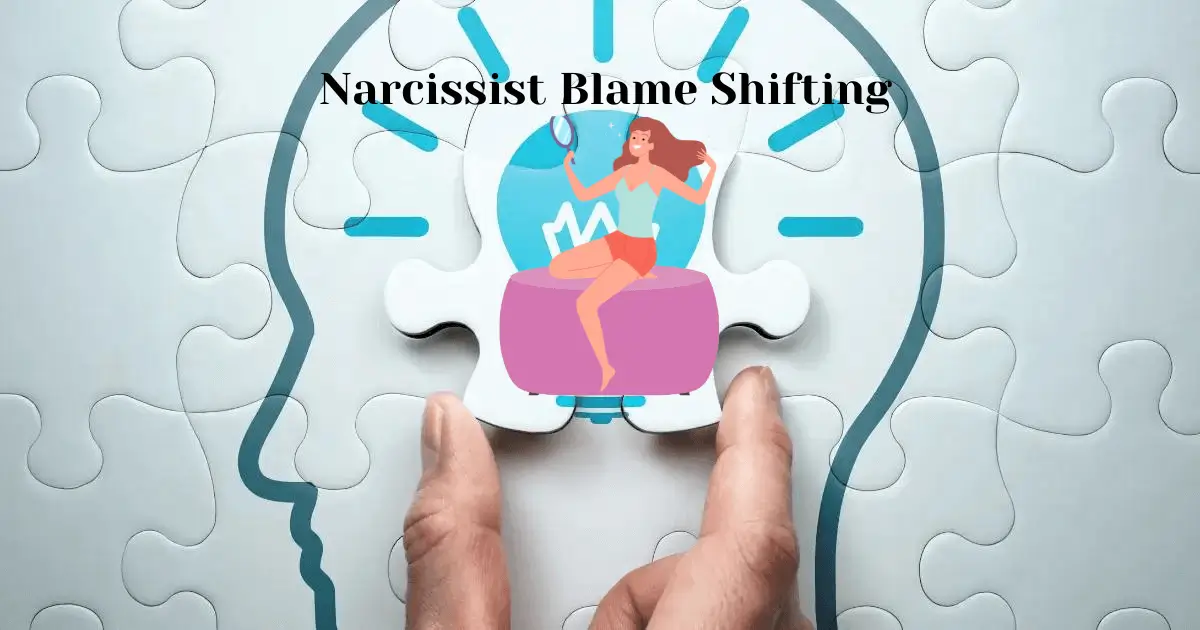Overview
Dealing with a narcissist is a complex and emotionally draining experience that starts on a turbulent path. How to deal with narcissist blame shifting is one of the most irritating strategies used by narcissists in this complicated environment. As a defensive mechanism, this sneaky behavior appears, keeping their fragile self-esteem safe from the painful truth of their failings.
Narcissists skillfully blame innocent targets when held accountable or confronted with their errors, which causes confusion and self-doubt in those who witness. Throughout this article, we will explore the complex dynamics of narcissistic blame-shifting and its intricacies. Additionally, we will provide people with valuable tools to help them not only deal with this manipulative behavior but also disarm it, paving the way for understanding, healing, and resilience. If you want to learn more about narcissist blame shifting and all about narcissism then you can read the valueable article by clicking on the link.
Understanding Narcissistic Blame Shifting
How to deal with narcissist blame shifting is a powerful defensive tactic employed by narcissists to preserve the carefully constructed illusion of perfection and protect their crisp self-esteem. Narcissists adeptly utilize their natural tendency to shift responsibility onto others when faced with criticism or the possibility of being held responsible for their actions. This multiplex activity is not just a deliberate decision; it’s a reflexive reaction meant to create a story that will discharge them from wrongdoing.
Within the narcissistic toolbox, blame-shifting is a complex art form. First of all, denial turns into a reliable pool, enabling the narcissist to flatly deny any accusation of guilt, even in the face of indisputable proof to the contrary. Secondly, deflection appears as a calculated distraction, deftly drawing attention away from their behavior by blaming others or external events for the problem.
Finally, projection turns into a potent weapon as the narcissist skillfully accuses others of actions for which they are also responsible by projecting their shortcomings onto them. In these ways, shifting blame turns into the central component of a narcissist’s defensive tactic, allowing them to maintain their accurately crafted aspect of faultlessness while navigating the complications of interpersonal relationships.
Identifying Narcissist Shifting the Blame

Recognizing the symptoms of narcissistic blame shifting is the first step towards how to deal with narcissist blame shifting. Gaining insight into the strategies used by narcissists will enable you to handle these difficult situations with greater skill. Typical indicators of shifting the blame are:
- Denial: In the domain of denial, the narcissist masters evasion, adamantly refusing to admit any wrongdoing, even in the face of unquestionable and substantial proof. Their denial of accountability is a buffer for their fragile sense of self, enabling them to maintain the delusion of perfection. People close to them struggle with the confusing and frustrating dynamics of selfish behavior due to their unwavering denial, which is frequently combined with a dismissive demeanor.
- Deflection: Narcissists are experts at evading responsibility by deftly drawing attention away from their deeds. They accuse others or place the blame on outside factors through a calculated deception, thereby disguising their accountability behind a cloud of suspicion. Through the skillful manipulation of focus and accountability, the narcissist can avoid scrutiny and maintain control over the narrative, leaving those around them in disbelief.
- Projection: Through the complex web of projection, narcissists blame others for actions that they are essentially guilty of, transferring their failings onto them. This psychological barrier acts as a mirror, reflecting their fears to the people around them. The narcissist attempts to manipulate perceptions and divert attention from their true nature by projecting their flaws outward, unfairly burdening others with baseless accusations. The complexity of managing relationships with narcissistic people is further increased by this crafty tactic, emphasizing the value of discernment and self-preservation. If you recognize projection easily you will know how to deal with narcissist blame shifting.
How to Deal with Narcissist Blame Shifting?
- Setting Limits

When dealing with a narcissist, it’s imperative to establish clear boundaries. Understand that their deceptive actions don’t represent your value or skills. Remember not to tolerate unjustified accusations or blame; express your limits clearly. Setting and upholding firm boundaries safeguards your mental and emotional health.
- Steer clear of emotional reactions.
Emotional responses are narcissists’ favorite stimuli. When faced with shifting blame, it’s critical to maintain composure. Emotional responses do nothing more than encourage the narcissist’s deceptive strategies. Maintain emotional distance and react in a calm, collected manner. This strategy is very important in how to deal with narcissist blame shifting.
- Recording Conversations
When a narcissist is transferring blame, document all of your interactions with the narcissist. Keeping track of particular events can be helpful when you need to get support from others or validate your experiences. Maintaining objectivity when confronted with gaslighting, another typical narcissistic ruse, can be facilitated by providing a factual account of what happened. Moreover recording conversations will allow you how to deal with narcissist blame shifting.
- Looking for Assistance
Because narcissists frequently use others to undermine their support systems, dealing with them can be isolating. Speak with loved ones, close friends, or a therapist for support and an unbiased viewpoint. Having a solid support system in place is crucial to preserving your own mental and emotional health.
- Effective Communication
Pick your battles carefully when interacting with a narcissist. Avoid using emotionally charged language that could be misunderstood or manipulated in favor of brief and clear communication. Reveal your thoughts and feelings using “I” statements to avoid giving the narcissist a chance to place the blame.
- Taking Care of Yourself

How to deal with narcissist blame shifting? Taking care of oneself becomes a life-saving shield when dealing with the emotional damage caused by dealing with a narcissist. The damaging effects that a relationship with a narcissist can have on one’s mental and emotional health underscore the necessity for deliberate self-preservation. Making self-care a priority means incorporating holistic well-being-promoting activities like regular exercise to reduce stress, meditation to develop inner peace and hobbies that offer a constructive outlet for self-expression.
People in relationships with narcissists can strengthen their psychological flexibility and regain a sense of agency and control over their own lives by investing time and energy into self-care practices.
This conscious self-care practice is a potent way to counteract the manipulative strategies used by narcissists. It also emphasizes how crucial it is to establish limits and preserve positive self-esteem in the face of the constant difficulties presented by narcissistic conduct. When people put their health first, they make room for emotional healing and personal development, which are crucial skills for negotiating the challenges of narcissistic relationships while maintaining one’s own emotional and mental balance.
In summary
In summary, dealing with a narcissist in a relationship requires a complex strategy based on tolerance, grit, and a steadfast dedication to self-preservation. Regaining control over one’s emotional health begins with identifying the subtle indicators of narcissistic behavior. Setting clear limits serves as a defense barrier, keeping people safe from the emotional upheaval brought on by assigning blame.
Maintaining a sense of personal agency by resisting the narcissist’s manipulative strategies by responding with measured composure rather than with emotional outbursts. Thoroughly recording interactions offers tangible support and a way to reflect on oneself, in addition to serving as a means of validation from others.
Self-care activities and effective communication techniques strengthen emotional resilience and foster a sense of personal empowerment. People can affirm their value and agency while overcoming narcissistic challenges by uniting around these strategies and standing firm. It is imperative to bear in mind that, during this process of recovery and self-exploration, obtaining expert assistance adds even more capabilities to the toolkit for managing the intricacies of relationships with narcissists. Through this group strugle, people can become stronger, more self-aware, and more capable of covering the way for actual recovery and true self-discovery. The above valueable and informational article covers all aspects regarding how to deal with narcissist blame shifting and we hope that your concers regarding this topic has been resolved.

